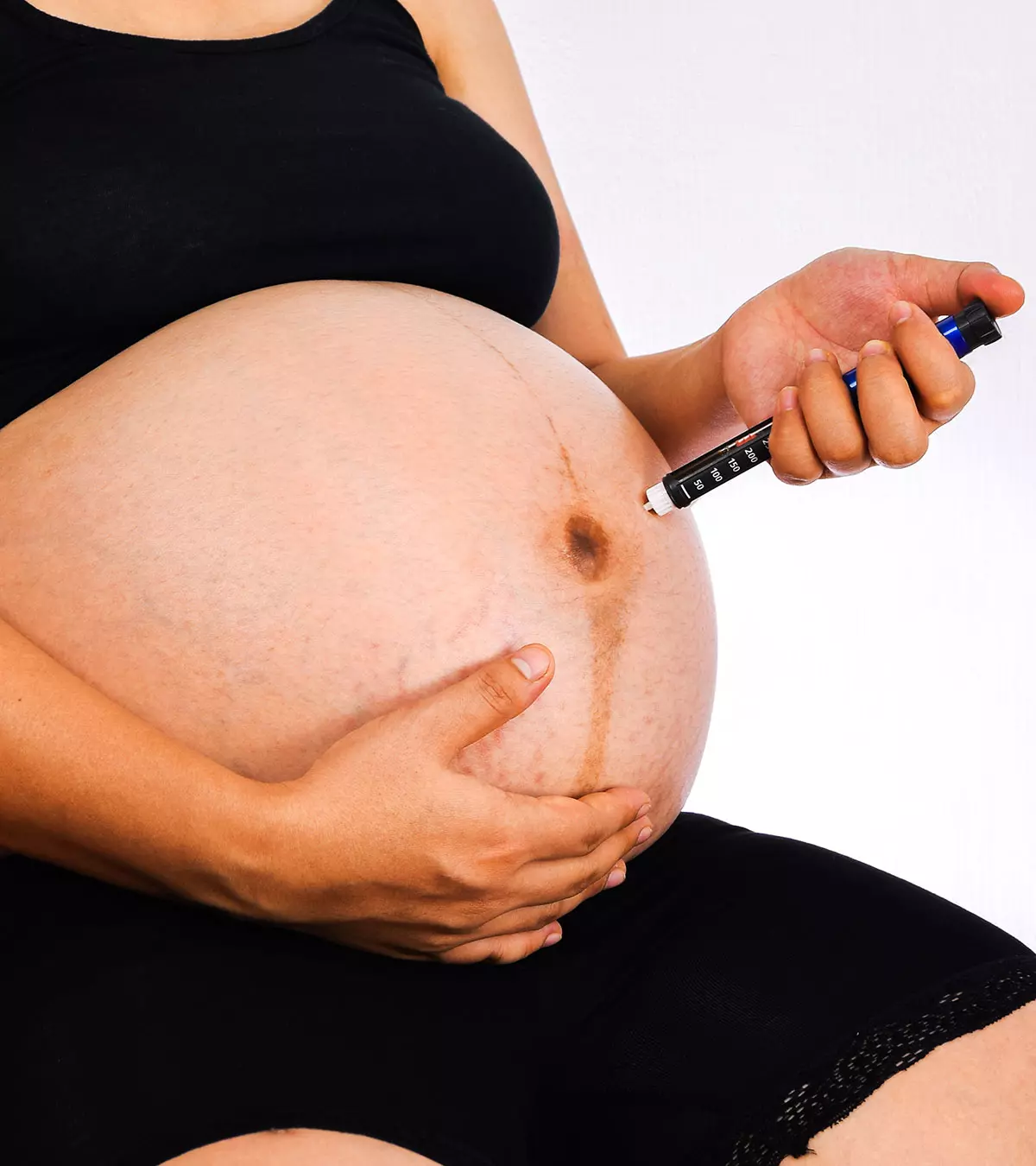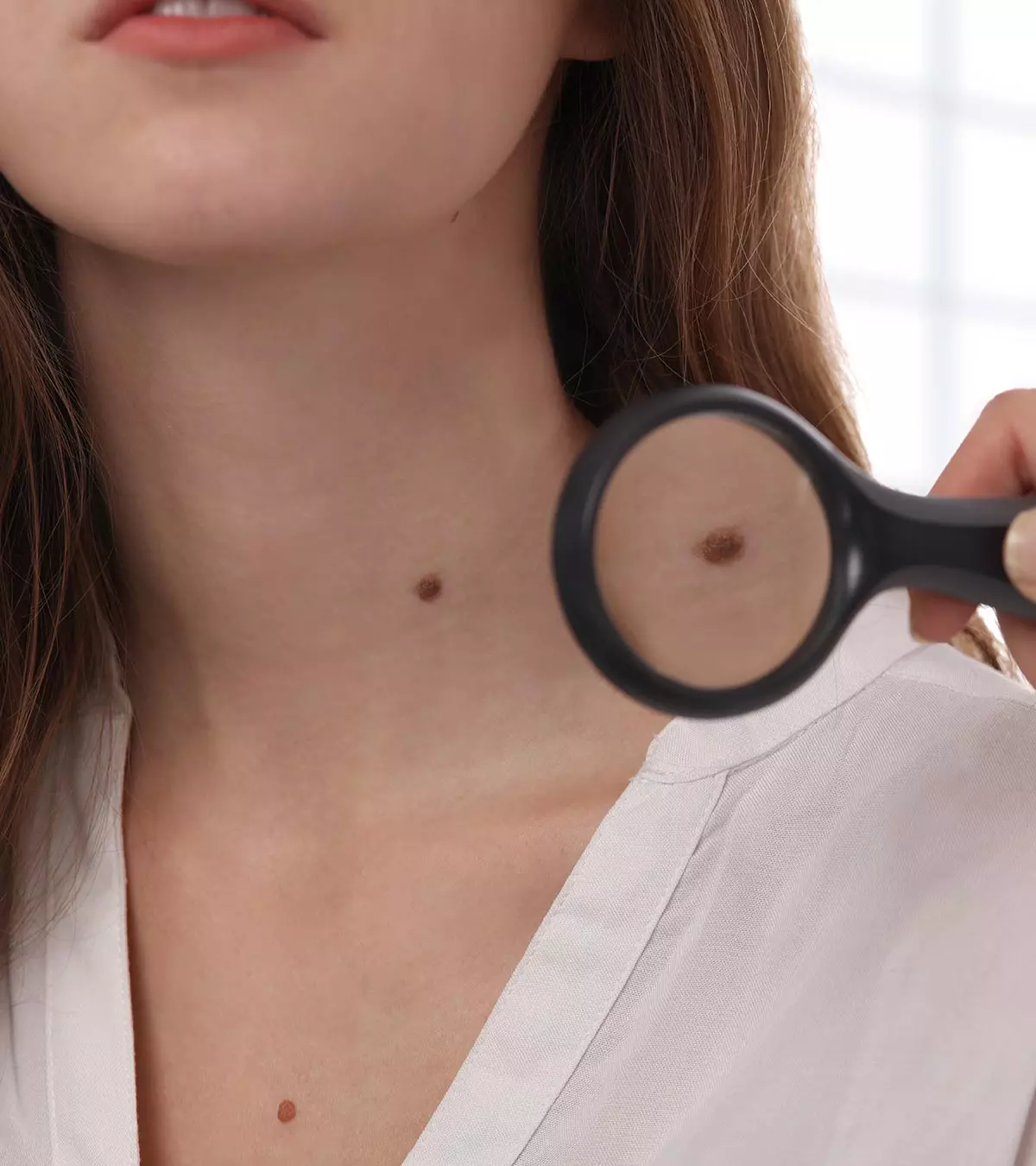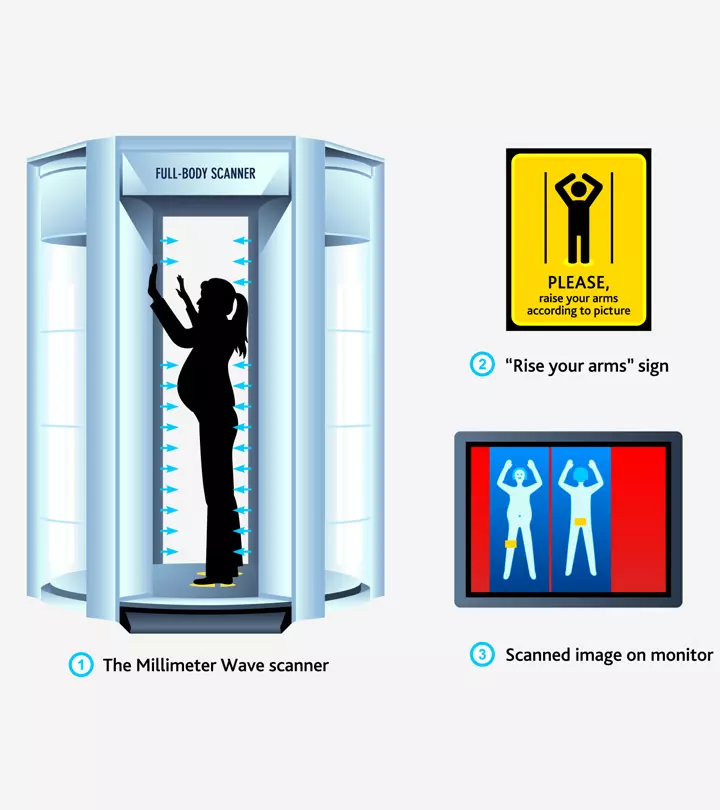
Image: ShutterStock
Most pregnant women worry about airport security checks and fear that being exposed to airport security scanners during pregnancy is not safe. They fear that the radiation waves from these body scanners may be harmful to the growing baby. The security scanners are generally of advanced technology, and the rays produced by these machines are low intensity and do not penetrate the skin. Thus, they cause no harm to the fetus (1). However, if you are still worried about your baby’s safety, you may take necessary precautions and even request security professionals for a physical search. Read on to learn more about the different types of airport security scanners and their effects on pregnancy.
Key Pointers
- Security scanners at airports are safe for pregnant women.
- The scanners emit low-intensity radiation that does not penetrate the skin or harm the fetus.
- Common types of airport scanners include millimeter radio wave scanners and backscatter scanners.
- Consult with a gynecologist before planning a flight journey to ensure the safety of the mother and the baby.
What Are Airport Scanners?
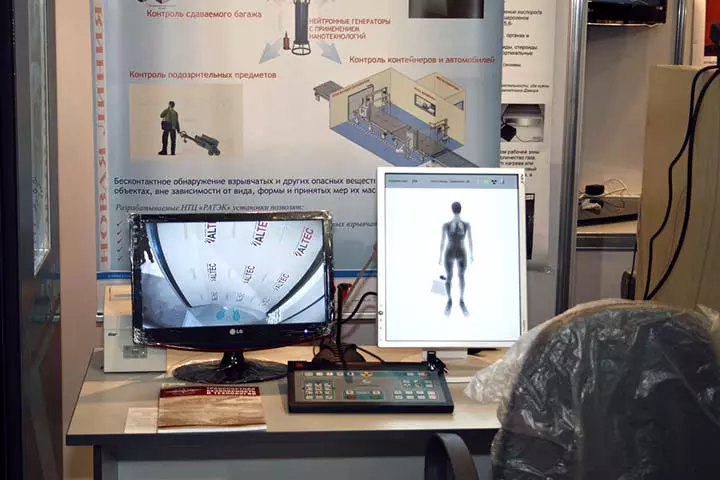
Airport scanners are the most advanced screening technology to detect potential threats hidden within a person’s body or clothing. It detects metallic as well as non-metallic items including knives, explosive devices, and weapons (2).
Different Types Of Airport Scanners
The two basic kinds of scanners typically used in airports are (3):
1. Millimeter Radio-wave Scanner:
- This particular type of scanner stands out at the airport, as the designing comprises a booth where the travelers had to stand with both their arms raised.
- Inside the cabin, the person’s body gets scanned via millimeter radio waves. The reflected waves are used for imaging purposes and are collected by the antennas to generate the image on the monitor.
- As the scanners do not make use of x-raysiElectromagnetic radiations used to capture images of the body's internal structures , they do not have any harmful impact on your growing fetusiA developing baby inside the mother's womb .
 Did you know?
Did you know?2. Backscatter Scanner:
- The backscatter scanner requires people to stand in between two large boxes by raising their arms.
- Inside the scanner device, the low-intensity x-rays capture the image of person’s body, within a few seconds.
- This scanner detects hidden objects under clothes or explosive items taped to the skin surface.
 Quick fact
Quick factProcedure Involved In A Body Scan At Airports

Before you pass through the airport scanner, under airport guidelines and regulations, you could be asked to remove all your personal assets, including wallets, tissue paper, identity cards, mobile phones, and boarding pass. You must also remove accessories like jewelry, jackets, belts, shoes, and bulky clothes.
You will then have to step onto the scanner device and stand with both your hands raised above your head level for approximately two to three seconds until the instrument captures the image. The screening officer reviews your scan results while you can then collect your personal belongings.
Are Airport Scanners Safe During Pregnancy?

Yes, according to researchers, airport scanning procedures that use metal detectors are considered safe for pregnant women. The Royal College of Obstetricians and Gynaecologists (RCOG) states that security scanners are considered safe, with no known risks for pregnant women or their fetuses (4). Whether it is a backscatter scanner or a millimeter radio-wave one, you can safely pass through them during your pregnancy.
 Experts say
Experts sayThe backscatter scanners use a low-frequency electromagnetic wave to detect the hidden objects or weapons inside a person’s dress. Due to the low-intensity x-ray, exposure to an airport scanner can cause no harm to your growing fetus. The scanner sees through the traveler’s clothing but not the skin. Due to the low penetration level of the electromagnetic wave, it can cause no harm to your body.
The millimeter-wave scanners, too, reflect away from your skin surface and cannot penetrate through it. Such waves can cause no harm to both you and your unborn baby.
The Radiation Protection Standard sets a maximum permissible exposure level for the public, including pregnant mothers and children.
However, if you have concerns over the safety of the scanners or feel uncomfortable passing through them, you can ask the security professionals for a physical ‘pat-down’ search (5).
Paula, a blogger and mother, reflects on her experience with airport security scans during pregnancy, “My doctor here in California advised me not to go through the modern X-ray machines at the airport security check. You know, the ones where you stand in the ‘X’ position while they take your picture. However, the TSA says on their website that they don’t use actual X-rays on these machines and they are safe for pregnant people as well, but you are entitled to ask for a pat-down instead if you want (i).”
Process Involved In A Physical Pat-Down
When you opt for a physical pat-down search, a female security officer runs her hand along your entire body, especially your breasts and belly, to check the presence of any hidden weapons. Make sure to reach the airport early, as the pat-down takes considerably longer time than the regular screening process.
 Point to consider
Point to considerTips To Have A Comfortable Flight Journey During Pregnancy
It is important to seek permission from your gynecologist before you plan a flight journey, especially if you have any health concerns. They will provide valuable advice and guidance depending on your health condition.
Here are some crucial tips that you should try to adhere to when you travel during pregnancy (6) (7):
- When you are in the initial phase of pregnancy, you must be having morning sickness. The problems can get exacerbated on flights, with a strong urge to throw up. Carry a small bag to make it easier for you to vomit. You may also try sipping on citrus fruit juice and chewing candies to curb the urge to vomit.

- During long flight journeys, get up from your seat and walk around every half an hour. It will make you feel good, promote blood circulation, and help reduce the risk of developing blood clots.
- To stay hydrated, try to sip a small amount of water at regular intervals.
 Quick tip
Quick tip- Select the middle seats to have a smoother ride.
- You can ask for an aisle seat to get some extra space for your legs.
- When you go on long-distance flights, carry all the essential medications with you.
- If you are part of the flight crew, it is advisable to opt for short-duration flights or ground duties to minimize radiation exposure (8).
- If you have a high-risk pregnancy, consult your doctor about the safety and necessary precautions for air travel (8).
- Carry all the vital supplies along with you like a comfortable pillow, dry fruits for hunger pangs and a discrete bag for air sickness. With such preparation, you can stay assured to have a smoother air trip.

How was your experience with security scanner at airports during pregnancy? Did you observe any discomfort while being scanned? If you have opted a pat-down, how convenient was that? Share your experiences here!
Frequently Asked Questions
1. How does radiation affect my fetus?
Radiation beyond the permissible exposure level set by the Radiation Protection Standard may adversely affect the growing fetus. The potential health hazards of prenataliThe time during pregnancy before a baby is born radiation exposure depend on the amount and period of the exposure, ranging from intellectual and physical disabilities at birth to a risk of cancer development (9).
2. Can my baby absorb radiation from me?
A growing baby inside a fetus can absorb radiation from their mother (9). However, scanners installed at airports are entirely safe for pregnant women.
3. Can airport scanners see my baby when I am pregnant?
Airport scanners do not produce your body image, so they cannot see your baby (10).
The effects of airport security scanners on pregnancy are not harmful as they use low-intensity rays that can penetrate through the clothes but not the skin. However, if you are anyhow uncomfortable exposing yourself to the ultraviolet rays while pregnant, you could quickly request a physical frisk by the security personnel. Remember to stay hydrated during the journey and ensure your comfort at all times. If you are in your third trimester, close to your delivery date, or have a high-risk pregnancy, it is best advised that you avoid traveling unless it is an emergency and you have the approval of your doctor.
Infographic: Types And Safety Of Security Checks In An Airport
There are many dos and don’ts that come with flying while pregnant, and the airport security check safety worry could be added to the list for some women. So, check out the infographic below to learn about different security checks available in the airport and if and how they are safe for pregnant women. Illustration: Momjunction Design Team
Illustration: Are Airport Scanners Safe During Pregnancy?
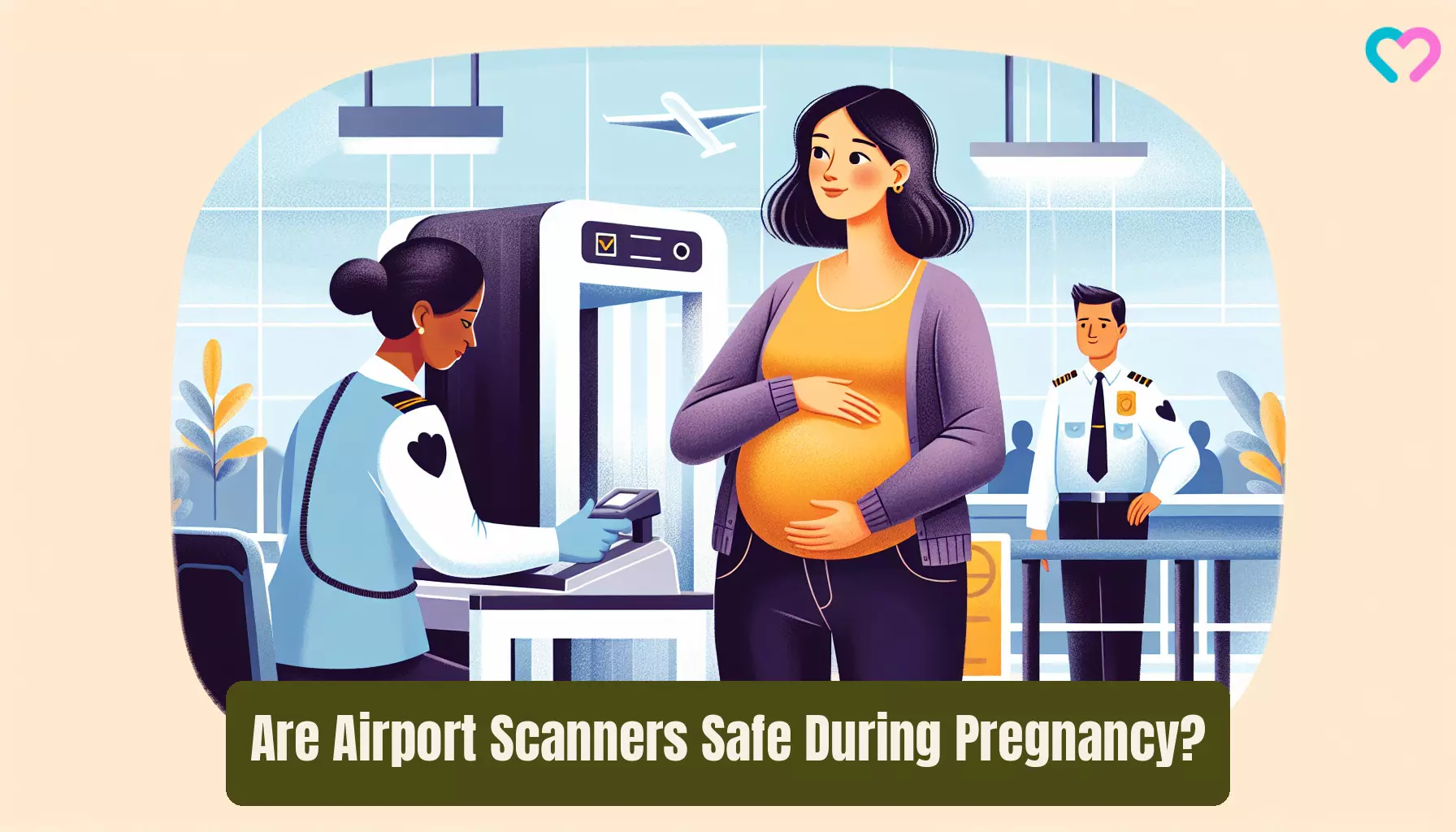
Image: Stable Diffusion/MomJunction Design Team
Are you wondering if it is safe for you to fly when pregnant? Find out the risks of air travel during pregnancy in this informative video.
Personal Experience: Source
MomJunction articles include first-hand experiences to provide you with better insights through real-life narratives. Here are the sources of personal accounts referenced in this article.
i. Traveling While Pregnant;
https://paulagaston.com/traveling-while-pregnant/
References
- Pregnancy and Security Screening.
https://hps.org/publicinformation/ate/faqs/pregnancyandsecurityscreening.html - Radiation and Airport Security Scanning.
https://www.epa.gov/radtown/radiation-and-airport-security-scanning - Information on Full Body Scanners at Airports.
https://radiationsafety.ca/info-on-full-body-scanners/ - Air travel and pregnancy.
https://www.rcog.org.uk/for-the-public/browse-our-patient-information/air-travel-and-pregnancy/ - Facts About Radiation from Airport Security Screening.
https://www.cdc.gov/radiation-health/data-research/facts-stats/airport-security-screening.html?CDC_AAref_Val=https://www.cdc.gov/nceh/radiation/airport_scan.htm - Travel During Pregnancy.
https://americanpregnancy.org/healthy-pregnancy/is-it-safe/travel-during-pregnancy/ - Travelling in pregnancy.
https://www.nhs.uk/pregnancy/keeping-well/travelling/ - Charles Savona-Ventura and Tahir Mahmood; (2022); Commercial Air And High-Altitude Travel by Pregnant Women: A scientific review commissioned by the European Board and College of Obstetrics and Gynaecology (EBCOG).
https://ebcog.eu/wp-content/uploads/2022/05/Air-Travel-and-Pregnancy-EBCOG.pdf - Radiation and Pregnancy: Information for Clinicians.
https://www.cdc.gov/radiation-emergencies/hcp/clinical-guidance/pregnancy.html?CDC_AAref_Val=https://www.cdc.gov/nceh/radiation/emergencies/prenatalphysician.htm - Travel Tips: Pregnant Travelers.
https://tsa.gov/videos/travel-tips-pregnant-travelers - Your rights at the airport.
https://www.gov.uk/airport-rights
Community Experiences
Join the conversation and become a part of our nurturing community! Share your stories, experiences, and insights to connect with fellow parents.
Read full bio of Dr. Neha Singh
Read full bio of Manjiri Kochrekar
Read full bio of Rebecca Malachi
Read full bio of Reshmi Das












